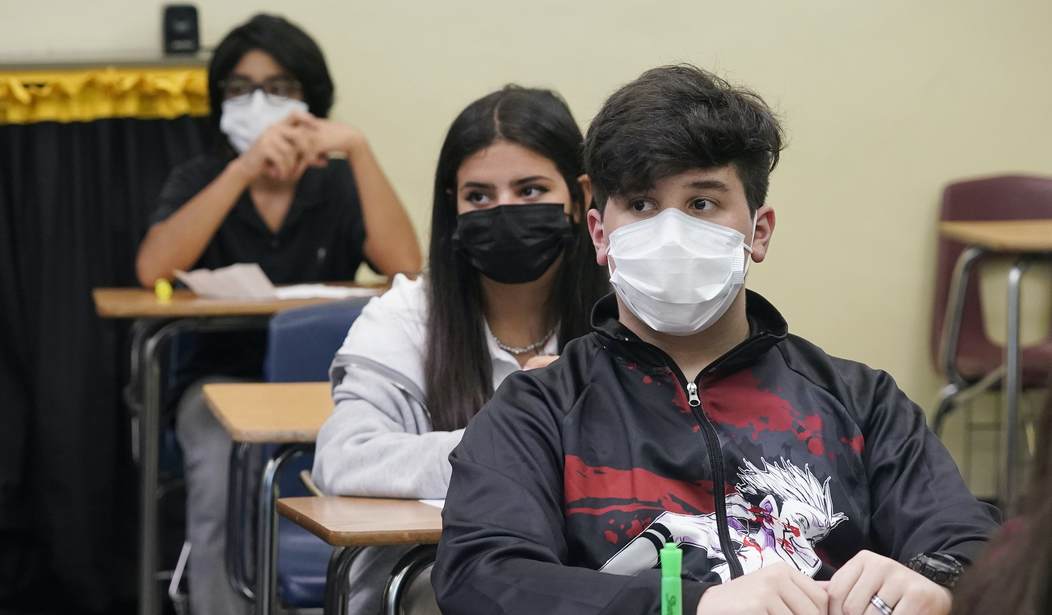If you’re going to mask them for monkeypox, you might as well mask them permanently. There’s a vastly greater risk, after all, that they’ll be exposed to COVID or the flu at school than that they’ll make contact with a virus that’s essentially (although not entirely) become an STD.
Technically speaking, masks are probably more effective at preventing monkeypox than they are at preventing COVID. The coronavirus floats in tiny aerosolized droplets that can pass through simple masks. The monkeypox virus lives only in larger respiratory droplets. If your mouth and nose are covered, those larger droplets aren’t getting through.
You want to guess how many kids across the entirety of the U.S. have contracted monkeypox, though, presumably from being in close quarters with an infected adult relative? Three, at last check. And since the virus seems to spread mostly through physical contact with an infected person’s pustules — or bodily fluids — your kid’s mask won’t save him if he’s playing tag or whatever at school and ends up accidentally touching a sick friend’s sores. A day-care worker in Illinois tested positive a few weeks ago and no one around him, including any of the children, got sick.
Aren’t those sores incredibly painful, by the way? What are the odds that any parent is sending a child to school when he has a rash that’s so sensitive that he cries out in agony when it’s touched?
I missed this NYT story last week but Josh Barro flagged it on Twitter. The piece is broadly accurate, emphasizing that the virus is currently spreading almost exclusively among gay men, that it’s “extraordinarily rare” among kids, that “indirect contact and environmental contamination is not a major source of transmission,” and that children are more likely to catch it at home than at school. And yet, somehow this deep thought made it in there:
Parents who are concerned about the virus may also be relieved to know that many pandemic precautions and behaviors can be repurposed to protect children against monkeypox: wearing masks in crowded indoor areas, avoiding sharing personal use items, increasing the frequency of hand washing and isolating at home when you’re sick.
It’s important to pay attention to new rashes and other symptoms, Dr. Kalu said. “Get your child assessed by a doctor if the rash starts spreading or is something you’ve not really seen on your child before.”
A random kid’s odds of contracting monkeypox must be extremely small, the odds of contracting it at school smaller still, and the odds of contracting it at school in such a way that infection wouldn’t have occurred if they were masked up downright minuscule. Journalist Benjamin Ryan rolled his eyes at the Times’s suggestion about masking and added some context:
There is NO evidence of #monkeypox transmission in schools anywhere around the world.https://t.co/oLx3iNHle7 pic.twitter.com/OZ9sO1sQ1s
— Benjamin Ryan (@benryanwriter) August 21, 2022
There are obvious strategies to limit the spread of monkeypox and none of them involve masking, for cripes sake. Step one: Be clear that gay men are at special risk so that they can take precautions against it and so that everyone else can chill out a little before they decide to make five-year-olds wear N95s. Step two: Make the vaccine as widely available as possible and prioritize gay men for vaccination. Step three: Postpone the orgy that’s scheduled after the local Pride event until next year, after all the participants have been vaccinated. Ryan gently admonished gay readers to do that in a piece he published recently. Sex columnist Dan Savage did the same. Some gay/bi men are listening:
A few weeks ago, Zachary Zane, a sex and relationships writer who runs a Brooklyn-based sex party called BISLUT for bisexual men and “their admirers,” began considering shutting his events down. In July, Zane stopped attending other sex parties out of fear of the virus. He thought BISLUT might be a particularly risky party because it caters to bisexual men, who are at higher risk for monkeypox than straight men; it also brings these men together with women who are not in the high-risk group. The party could be a “bridge” between these communities, he surmised. So he canceled the party.
Despite the best efforts of public health officials to confuse the public about how the virus is spreading by focusing on how it might spread, the message seems to finally be getting through. Ryan points to these encouraging numbers:
BREAKING: @CDCgov reports, based August 5-15 survey with with 787 gay and bisexual men, that to prevent #monkeypox:
🔹48% reduced number of sex partners
🔹50% reduced one-time sexual encounters
🔹49% reduced sex with partners met on apps or at sex venues.https://t.co/pWQRF4xJhg pic.twitter.com/l4ZQCls9zG— Benjamin Ryan (@benryanwriter) August 22, 2022
There is evidence that sexual behavior change, perhaps complementing widespread vaccination, is contributing to the flatting of the #monkeypox curve, and perhaps even a reduction in the rate of new cases, in New York City. pic.twitter.com/Y6e6j0xFHI
— Benjamin Ryan (@benryanwriter) August 22, 2022
This CDC data is encouraging too:

Note the change from the week of August 6 to the week of August 13, when there were more tests than the week before but fewer positives. That suggests that the spread really is beginning to slow, that it’s not just an artifact of under-testing. So let’s cancel the great school monkeypox masking advisory and get back to normal-ish. Do better, NYT.








Join the conversation as a VIP Member